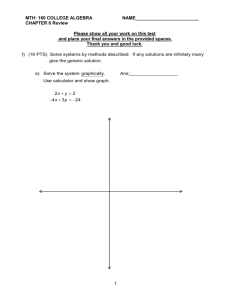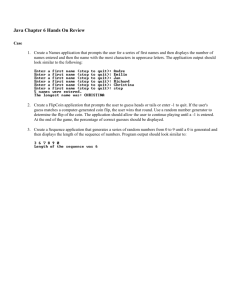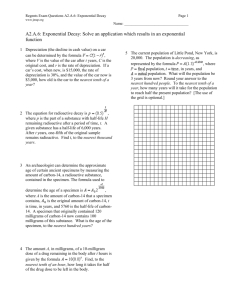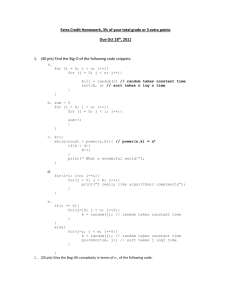Child Development Study Guide: Pregnancy & Prenatal Care
advertisement
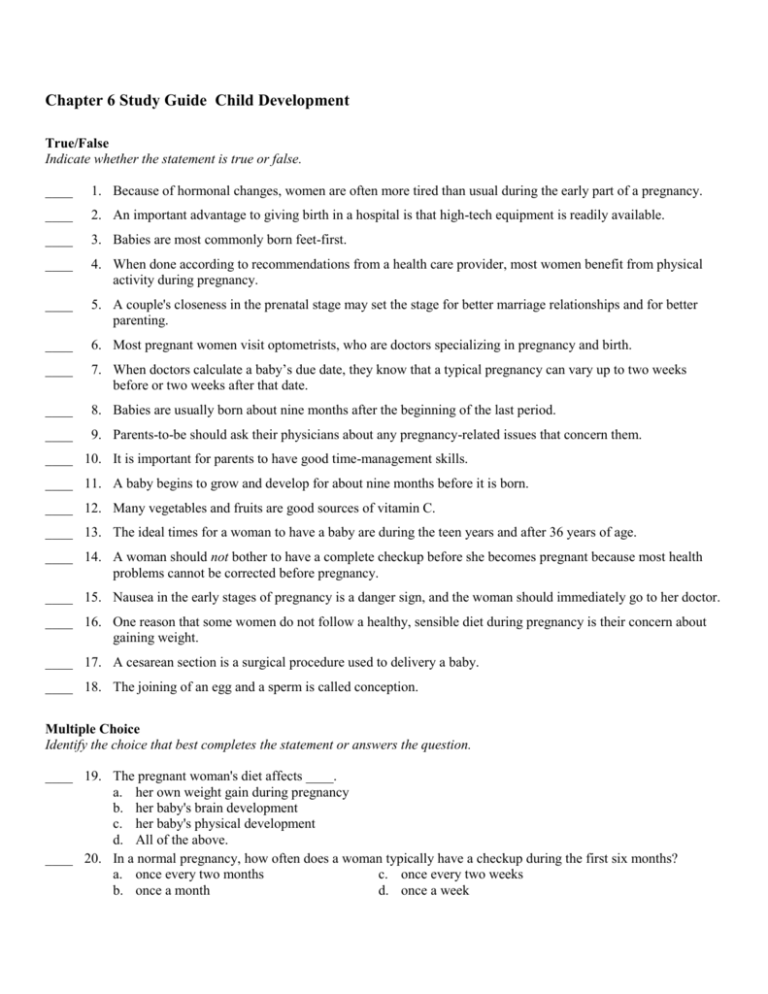
Chapter 6 Study Guide Child Development True/False Indicate whether the statement is true or false. ____ 1. Because of hormonal changes, women are often more tired than usual during the early part of a pregnancy. ____ 2. An important advantage to giving birth in a hospital is that high-tech equipment is readily available. ____ 3. Babies are most commonly born feet-first. ____ 4. When done according to recommendations from a health care provider, most women benefit from physical activity during pregnancy. ____ 5. A couple's closeness in the prenatal stage may set the stage for better marriage relationships and for better parenting. ____ 6. Most pregnant women visit optometrists, who are doctors specializing in pregnancy and birth. ____ 7. When doctors calculate a baby’s due date, they know that a typical pregnancy can vary up to two weeks before or two weeks after that date. ____ 8. Babies are usually born about nine months after the beginning of the last period. ____ 9. Parents-to-be should ask their physicians about any pregnancy-related issues that concern them. ____ 10. It is important for parents to have good time-management skills. ____ 11. A baby begins to grow and develop for about nine months before it is born. ____ 12. Many vegetables and fruits are good sources of vitamin C. ____ 13. The ideal times for a woman to have a baby are during the teen years and after 36 years of age. ____ 14. A woman should not bother to have a complete checkup before she becomes pregnant because most health problems cannot be corrected before pregnancy. ____ 15. Nausea in the early stages of pregnancy is a danger sign, and the woman should immediately go to her doctor. ____ 16. One reason that some women do not follow a healthy, sensible diet during pregnancy is their concern about gaining weight. ____ 17. A cesarean section is a surgical procedure used to delivery a baby. ____ 18. The joining of an egg and a sperm is called conception. Multiple Choice Identify the choice that best completes the statement or answers the question. ____ 19. The pregnant woman's diet affects ____. a. her own weight gain during pregnancy b. her baby's brain development c. her baby's physical development d. All of the above. ____ 20. In a normal pregnancy, how often does a woman typically have a checkup during the first six months? a. once every two months c. once every two weeks b. once a month d. once a week ____ 21. The nutrients that athe body needs are a. Protein, Glucose, Vitamins , Minerals & c. Protein, Vitamins, Minerals, Carb’s & Fats Fats b. Protein, Glucose, Vitamins, Minerals & d. Protein, Vitamins, Minerals, Carb’s & Carb’s Sugar ____ 22. Which of these health care professionals is not a doctor, but is trained to assist women in childbirth? a. pediatrician c. midwife b. obstetrician d. surrogate mother ____ 23. Doctors who specialize in pregnancy and birth are called ____. a. internists b. gynecologists c. obstetricians d. pediatricians ____ 24. A healty diet contains how many types of nutrients taht a body needs? a. 5 c. 3 b. 4 d. 2 ____ 25. The Groups listed in the Food Guide Pyramid are a. Grains, Vegetables, Fruit, Milk & Meat c. Grains, Vegetables, Fruit, Milk, Fats & Meat b. Grains, Vegetables, Milk, Meat & Fats d. Grains, Vegetables, Fruit, Milk Carb’s & Meat ____ 26. Which of the following statements is true regarding a pregnant mother's weight? a. A mother should not worry about being her ideal weight before becoming pregnant. b. Most doctors do not try to make major changes in the mother's weight during pregnancy. c. Even if a pregnant woman eats less than before she was pregnant, she will still have enough nutrients left over to help her baby grow properly. d. A pregnant woman should try to follow her doctor's recommended diet when convenient. ____ 27. Which of the following statements is NOT true about a preganant woman’s personal care? a. Avoid alcohol, tobacco, & all drugs c. Moderate exercise such as walking b. Get plenty of rest d. Increase the amount of stress ____ 28. Which of these is not a common sign of pregnancy? a. being tired or feeling faint b. swollen and tender breasts c. having a menstrual period earlier than usual d. a full feeling or mild ache in the abdomen ____ 29. Most women feel tired during the ____ of pregnancy. a. first few months and the last few weeks b. fourth, fifth, and sixth months c. second month and the eighth month d. entire nine months ____ 30. I am going to work really hard in the class 2nd 9 weeks so i can pass and get a good grade a. Yes b. Yes ____ 31. The Role of Vitamins are a. Ensures the eyes develop c. Build teeth, gums, and bones b. Overall development d. All of the above ____ 32. Pregnant women should avoid ____. a. contact sports b. any unnecessary physical activity c. walking for exercise ____ 33. ____ 34. ____ 35. ____ 36. ____ 37. ____ 38. ____ 39. ____ 40. ____ 41. ____ 42. ____ 43. d. both a and b. What are your choices as to where you can have the baby? a. Hospitals, Birthing Rooms & Home c. Hospitals, Alternative Birth Centers & Home b. Hospitals, Birthing Rooms & Alternative Birth Centers Experts suggest that women of healthy prepregnant weight gain ____ pounds during pregnancy. a. 5 to 15 b. 15 to 25 c. 25 to 35 d. 35 to 45 The Role of Protein is a. Vital for the growth of the baby c. Makes bones and teeth b. Helps repair the baby’s body d. Provides heat and energy There aer how many Groups in teh Food Guide Pyramid a. 6 c. 5 b. 7 d. 4 For a healthy baby, medical care and supervision should begin ____. a. only for the mother's first baby b. as soon as a woman thinks she might be pregnant c. a few months before delivery d. only if the mother does not feel healthy Mrs. Stringer is my FAVORITE teacher a. Yes b. Yes There are how many Vitamins that the baby needs a. 3 c. 4 b. 5 d. 2 The six categories of basic baby supplies are a. Diapers, Clothing, Feeding, Bedding, c. Diapers, Clothing, Feeding, Bedding, Play Bathing & Travel & Travel b. Diapers, Wipes, Clothing, Feeding, Bedding, & Travel Which statement is true of prenatal development? a. The mother's body affects the baby. b. The baby's body affects the mother. c. The bodies of mother and baby affect one another. d. None of the above. The first doctor's appointment prepares soon-to-be-parents for the pregnancy. Which of the following will the doctor's exam include? a. The doctor will gather general information and the couple's health history. b. The doctor will ask for information about the woman's menstrual cycle and other pregnancies. c. The doctor will weigh the woman and take pulse, blood pressure, and respiration rates. d. All of the above. Which are teh doctors certified to take care of the mother and deliver the baby a. Obstetricians, Family Doctors & c. Obstetricians, Licensed Midwifes & Pediatricians Gynecologist b. Obstetricians, Family Doctors & Licensed Midwifes ____ 44. Which are the ways expectant parents can prepare for the birth of a child? a. Choose a doctor, choose a place of c. Choose a doctor, inform the family & read delivery & attend classes baby books b. Choose a doctor, a hospital & attend classes ____ 45. In which of these situations should a pregnant woman immediately contact her doctor? a. muscle cramps in the legs c. heartburn b. vaginal bleeding d. sleepiness Chapter 6 Test Child Development Answer Section TRUE/FALSE 1. ANS: T PTS: 1 REF: p. 132 NAT: NASAFACS 15.4.1 | NASAFACS 15.4.2 2. ANS: T PTS: 1 REF: p. 156 3. ANS: F Babies are most commonly born head-first. 4. 5. 6. 7. 8. 9. 10. 11. 12. 13. 14. 15. NAT: NASAFACS 12.2.2 | NSES F PTS: 1 REF: p. 133 NAT: NASAFACS 15.4.1 ANS: T PTS: 1 ANS: T PTS: 1 ANS: F PTS: 1 ANS: T PTS: 1 REF: p. 131 NAT: NASAFACS 15.4.1 ANS: T PTS: 1 ANS: T PTS: 1 ANS: T PTS: 1 REF: p. 144 NAT: NASAFACS 15.1.2 ANS: T PTS: 1 ANS: T PTS: 1 REF: p. 138 NAT: NASAFACS 12.1.1 | NSES F ANS: F PTS: 1 ANS: F PTS: 1 ANS: F Nausea is normal during the early stages of pregnancy. PTS: 16. ANS: NAT: 17. ANS: 18. ANS: 1 REF: p. 132 NAT: NASAFACS 15.4.1 T PTS: 1 REF: p. 137 NASAFACS 12.1.2 | NASAFACS 15.4.1 | NSES F T PTS: 1 REF: p. 133 NAT: NSES F T PTS: 1 MULTIPLE CHOICE 19. 20. 21. 22. 23. 24. 25. 26. 27. 28. 29. 30. ANS: ANS: ANS: ANS: ANS: ANS: ANS: ANS: ANS: ANS: ANS: ANS: D B C C C A C B D C A A PTS: PTS: PTS: PTS: PTS: PTS: PTS: PTS: PTS: PTS: PTS: PTS: 1 1 1 1 1 1 1 1 1 1 1 1 REF: p. 131 NAT: NASAFACS 15.1.1 | NSES F REF: p. 155 NAT: NASAFACS 15.3.1 REF: p. 129 NAT: NASAFACS 15.4.1 31. 32. 33. 34. 35. 36. 37. 38. 39. 40. 41. 42. 43. 44. 45. ANS: ANS: ANS: ANS: ANS: ANS: ANS: ANS: ANS: ANS: ANS: ANS: ANS: ANS: ANS: NAT: D PTS: 1 A PTS: 1 C PTS: 1 C PTS: 1 A PTS: 1 A PTS: 1 B PTS: 1 A PTS: 1 C PTS: 1 A PTS: 1 C PTS: 1 D PTS: 1 B PTS: 1 A PTS: 1 B PTS: 1 REF: p. 133 NASAFACS 15.1.1 | NASAFACS 15.4.1 | NSES F

